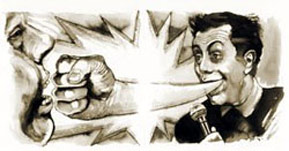
Greg Crosby
http://www.jewishworldreview.com --
I HAVE A FRIENDLY working relationship with words.
I maintain a healthy respect for them and try not to abuse them, and they’ve been pretty good to me -- allowing me to make a living with them for almost thirty years.
Words and I understand each other. I have used profanity. Although I try to avoid vulgar words as part of my everyday vocabulary when communicating with others, I am not afraid of them and they do not shock me. Vulgarity does offend me, however, when it is fired at me without warning by the mainstream broadcast media.
Anyone who watches network television or listens to the radio with any regularity can attest to the fact that the bar of acceptable broadcast language has been lowered to new depths. It is fairly common now to hear words and phrases on the air that, just a few short years ago, one only heard in boot camps, saloons, and unfortunately, on school playgrounds.
This phenomenon isn’t as prevalent in newspapers, magazines or journals probably because of the popular notion that the printed word is forever, while a broadcast word, once it is spoken, is gone with the wind. This is not exactly the case. Actually, the broadcast word can have a more profound effect on popular culture than can the printed word.
First, the broadcast word can instantaneously reach a larger and more diverse audience than any newspaper or magazine. Add to that the cumulative effect of hammering repetition (that broadcasting does so well) and suddenly words and phrases that were previously considered inappropriate for polite society, take on an air of cultural acceptability. A media stamp of approval, so to speak.
Average young people watch above-average good looking young actors speaking a certain way on television. These actors look, sound, and act cool. Young people emulate the speech pattern, cadence, and words they hear their peers speaking on TV. They want to be cool, too.
It seems that just about anything goes today on television and radio. That includes disgusting phrases that, while not using vulgar words per se, employ crude ideas, and coarse descriptions of bodily functions.
A lot has changed in the last twenty-five years or so, since comedian George Carlin first performed his “Seven Words You Can Never Use On Television” routine. For one thing, two of the original seven words are now commonly used on mainstream radio and television.
 |
There was a time when broadcasters took an entirely different tact with regards to their audience. A genteel respect was projected. “Thank you so much for inviting us into your home tonight,” was a commonly heard broadcast phrase back then. This gesture of humble graciousness set a tone for the broadcast.
Now when these guests enter our homes, they get drunk, insult us, throw up on the rug, and burn holes in our furniture. And then they wonder why they are not as popular as they once were.
On one level, words are simply the primary tool of communication which enable ideas and desires to be understood between people.
On another level, however, words actually define us as a culture. Which words we choose to use, how we use them and to whom they’re used, can tell a great deal about our attitude towards ourselves and society.
Yes, I have used profanity, but I try to control it -- for my own self-respect and as a courtesy to people around me. If I can refrain from using vulgarity out of respect for others, why can’t broadcasters extend the same courtesy to its audience?
Being polite, using proper manners and good taste are not options when visiting someone in their home--it’s simply a thing that civil people do.
If broadcasters exercised that same civility towards their viewers, perhaps they would be welcomed into more
JWR contributor Greg Crosby, former creative head for Walt Disney publications, has written thousands of comics, hundreds of children's books, dozens of essays, and a letter to his congressman. You may contact him by clicking here.
08/19/99: The Golden Age of Jerkdom
08/12/99: Dressing Down...and Out

